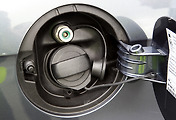Rule of thumb: The generally accepted rule is that diesel is worthwhile for people who drive a lot, and that anyone else should choose a gasoline-driven car. After all, a diesel-powered car consumes up to 25 percent less fuel, but gasoline-powered cars are often cheaper in terms of purchase price, insurance, and running costs. In Germany, depending on the model, a diesel-powered car will be worth the extra investment if annual mileage exceeds 15,000 kilometers.
Both powertrains have their strengths: When deciding which powertrain to choose, however, drivers should consider more than just annual mileage: “Both powertrains have their strengths in different vehicle classes. A modern gasoline powertrain makes even affordable compact cars efficient, while an advanced diesel powertrain can keep consumption low and driving enjoyment high in a big station wagon,” says Dr. Rolf Bulander, member of the board of management of Robert Bosch GmbH. There are similar advantages in other segments as well: while the responsiveness of modern gasoline powertrains makes them stand out in thoroughbred sports cars, the strong torque of the diesel powertrain is best for large SUVs.
Info chart: Bosch has put together a compact chart outlining the information drivers need to make the right choice. The advantages of the two powertrains are compared, and those who are uncertain can decide whether their individual driving profile is best suited to the diesel or gasoline variant. In addition, the info chart provides insights into the German car market, and shows the best-selling gasoline and diesel models.
Automotive Technology is the largest Bosch Group business sector. In 2013, its sales came to 30.6 billion euros, or 66 percent of total group sales. This makes the Bosch Group one of the leading automotive suppliers (NB: Due to a change in accounting policies, the 2013 figures can only be compared to a limited extent with the 2012 figures). Automotive Technology largely operates in the following areas: injection technology for internal-combustion engines, alternative powertrain concepts, efficient and networked powertrain peripherals, systems for active and passive driving safety, assistance and comfort functions, technology for user-friendly infotainment as well as car-to-car and Car2X communication, and concepts, technology, and service for the automotive aftermarket. Bosch has been responsible for important automotive innovations, such as electronic engine management, the ESP anti-skid system, and common-rail diesel technology. |
PI8633 - July 21, 2014
/ Photo & Report provided by Bosch Press Release - sujung.jang@kr.bosch.com
/ MediaPaper.KR mediapaper@ymail.com Sejin Oh
/ The News Article was written by receiving a Press Release.
'Car > BOSCH' 카테고리의 다른 글
| The new Bosch HEF109-L starter motor for commercial vehicles (0) | 2014.08.22 |
|---|---|
| Bosch Press Information from the division Automotive technology (0) | 2014.08.04 |
| Gas-powered cars: CNG is not LPG (0) | 2014.07.29 |
| World's leading supplier Four billion Bosch MEMS sensors (0) | 2014.06.30 |
| Uta-Micaela Dürig appointed to the board of management of the Robert Bosch Stiftung (0) | 2014.06.30 |






댓글